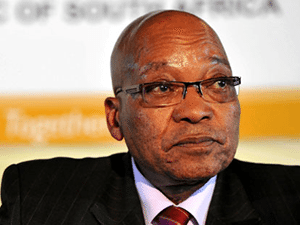
[miningmx.com] – JACOB Zuma put the revitalisation of mining communities, mining charter compliance, and a re-commitment to the mining sector’s 2012 Framework Agreement to the top of the national worry list as he kicked off his second term as the country’s president.
Delivering the annual State of the Nation Address, Zuma told parliament that it was critical the country deliberated on the violent nature of strike activity and its duration, and attempt to bridge wage and social inequality as manifest on the country’s mines.
Zuma’s comments come as a strike over wages in the platinum sector, launched by the Association of Mineworkers & Construction Union (AMCU) on January 23, is due to enter its 22nd week.
There has been an in-principle signed agreement on wages, but an industry source told Miningmx that disparities in the detail of the proposed wage settlement may delay signing of a final wage pact longer than anticipated.
Zuma sought to give impetus to his plans by calling on some of his most senior ministers including deputy president, Cyril Ramaphosa, who would be charged with “… convening a social partners’ dialogue in the ambit of Nedlac [National Economic Development and Labour Council]’.
Jeff Radebe, minister in the Presidency, had been asked to lead an inter-ministerial committee to “… further promote living conditions for mine workers’, while Zuma himself said he would take up the role occupied by former deputy president, Kgalema Motlanthe, in pressing home the decisions of the 2013 Framework Agreement. The agreement set down a code of behaviour for issues relating to labour disagreements and strike activity.
The inter-ministerial committee would attempt to marry the work of the mines ministry, and the ministries of water sanitation, trade and industry, social development, labour, human settlements, health, and economic development and finance, Zuma said.
Said Zuma: “Government will play its part in the implementation of the landmark Framework Agreement for a sustainable mining industry. The process will now be led by the president.
“We will implement the undertaking to build housing and other services to revitalise mining towns as part of the October 2012 agreement between business, government and labour,’ he said.
Said Zuma: “Given the impact of the labour relations environment on our economy, it is critical for social partners to meet and deliberate on the violent nature of strikes and their duration.
“The social partners will also need to deliberate on wage inequality. As government in this term we will investigate the possibility of a national minimum wage as a key mechanism to reduce income inequalities”.
“As government in this term, we will investigate the possibility of a national minimum wage as key mechanism to reduce income inequalities,’ Zuma said.
The South African government was monitoring the compliance of mining companies in respect of mining charter targets which face a 10-year deadline at the year-end, first set around the promulgation of the Mineral & Petroleum Resources Development Act (MPRDA) in 2004.
“Companies are expected to convert all or upgrade hostels into family units, attain an occupancy rate of one person per room, and facilitate home ownership for mine workers,’ said Zuma to applause in parliament.
“We urge companies to meet the 2014 deadline for these targets and extend this right to dignity to mine workers,’ he said.
“We are determined to work with the private sector to remove obstacles to investment. We would like to see the private sector showing as much confidence in the economy as the public sector,’ Zuma said.
Judith February, a political analyst, said on eNews, that Zuma’s address was lacklustre. “There was nothing particularly new. We are facing an economic crisis here which calls for leadership,’ she said.
Julius Malema, head of the Economic Freedom Fighters, accused Zuma of saying “… a whole lot of nothing”, and added that his pledge to enforce the mining charter was empty as mining bosses “did not take it seriously”.
“The issue of housing and working conditions including the living conditions is well articulated in the mining charter which mining bosses are not complying with,” said Malema. “The most exciting he [Zuma] could have done is to resign,” he said.
However, Ebrahim Patel, South Africa’s Economic Development minister, said Zuma’s address would mollify international investors.
“If I was an investor I would hear the ecomony is centre stage. The mining crisis will receive the attention not just to resolve the strike, but do deal with the underlying problems,” he said in an interview with eNews.
Zuma also marked out the country’s energy sector for “radical transformation’ including the way state-owned companies, such as Eskom, were managed by government departments, and called for an acceleration of the building of a third coal-fired power station, referred to as “Coal 3’.
“We need to respond to energy constraints,’ said Zuma. “A successful electrification programme was achieved by tapping into artificial electricity reserves not designed to cater for mass energy distribution.
“This situation calls for radical transformation of energy sector to develop a sustainable energy mix that comprises coal, wind, hydro gas, and nuclear energy.
“The energy plan also calls for the injection of capital and human resources into the energy sector,’ said Zuma.










